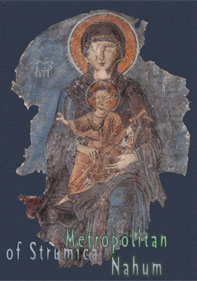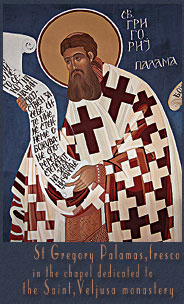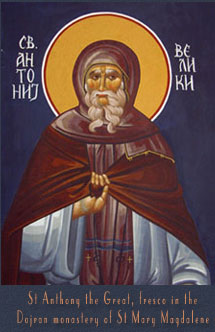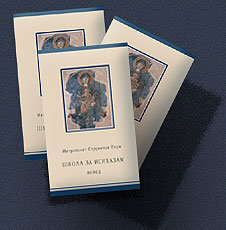School for Hesychasm ( 09.02.2005 )


F O R E
to Book 1
For as many as are led by the Spirit of God,
These are sons of God.
For you did not receive
 The spirit of bondage again to fear,
The spirit of bondage again to fear,
But you received the Spirit of adoption by
Whom we cry out, “Abba, Father.”
(
For all who truly desire spiritually to grow and be perfected, according to the commandment of our heavenly Father, the only true, unavoidable, and irresistible criterion is the Godman Christ. He became Man so that we become gods by grace. His Incarnation has rendered us personal partakers of the fruits of for us salvific communion of the properties of the Divine and human natures in His Hypostasis. Our bodies have become a shrine of the Holy Spirit Who abides in us...
In this historical and eschatological happening the theological (Christological) and anthropological basis is laid, that is, the ecclesial basis of Orthodox (hesychastic) spirituality: in the way that the Godman Christ has shown us with His Incarnation, and with His entire Dispensation for our salvation as well. He has done all ‘from within’, immensely suffering at that. The Son of God saves man not through giving orders from the heavens and through demonstration of power, as some power-holder and judge, but contrariwise, He has revealed Himself to us through loving identification with us. He has adopted in Him our fallen human nature (apart from sin) and has made it His own, healing and deifying it.
The Godman Christ with His Divine Dispensation has rendered us partakers of His uncreated grace (energy), which we receive in the Church as a pledge and fullness at the Holy Mystery of Baptism. It is that same grace which makes of us ‘a chosen generation, a royal priesthood, a holy nation’. Certainly, only if ascetically and consciously we participate in the liturgical time and space at the Holy Mystery of Eucharist as partakers of the Body and Blood of Christ.
Saint Gregory Palamas says that in these two Holy Mysteries – Baptism and Eucharist (Divine Liturgy) – consists our whole salvation, since in them is the fullness of Theanthropic Dispensation.
Yet, let us dwell upon this ‘ascetically and consciously’. Communion in the life-giving Divine energy in the Church and spiritual growth are not given automatically and guaranteed by Baptism and Eucharist. The Lord gives us the grace of Holy Baptism only as a pledge, and whether it becomes active, it depends to a great extent on us and it is achieved with a free willing struggle, as a gift of God. The way of its actualization is in fact a way of ascetical-hesychastic perfection and conquering of the inner areas, a way of ‘man’s deification’, and by this a way of his salvation as well. It is the ‘narrow way’ shown to us by the Godman Christ:
“You have heard that it was said to those of old, ‘You shall not murder.’ But I say to you that whoever is angry with his brother without a cause shall be in danger of the judgment…”
“You have heard that it was said to those of old, ‘You shall not commit adultery.’ But I say to you that whoever looks at a woman to lust for her has already committed adultery with her in his heart.”
And, “Blessed are the pure in heart, for they shall see God” (Matt. 5:8).
What are these words if not counsels that it is necessary to be watchful even over the thoughts our mind brings down in the heart and to purify the heart from the passions that defile it?
And in this process of purification (transformation of the passions), apart from the continuing practice of prayer, the fulfillment of the commandments in obedience to a spiritual father (with whom we check all our thoughts, desires, and feelings),  the proper confession and the intensive ascetical struggle are priority tasks up to the crucial moment of prayerful opening of the heart, and they should lead to the essential and radical spiritual transformation that the Holy Fathers know and name as ‘gift of illumination’, and which, for its part, on the plane of the prayerful struggle manifests as the beginning of the mind-and-heart prayer.
the proper confession and the intensive ascetical struggle are priority tasks up to the crucial moment of prayerful opening of the heart, and they should lead to the essential and radical spiritual transformation that the Holy Fathers know and name as ‘gift of illumination’, and which, for its part, on the plane of the prayerful struggle manifests as the beginning of the mind-and-heart prayer.
About the meaning of this prayer and the necessity of it, both for our personal spiritual perfection and our true participation in the eucharistic life of the Church, our father and episcope Metropolitan Nahum of Strumica tells us already in his introduction, and concretely about the ways of its acquisition, he relates to us the testimonies of the 20th century hagiorite fathers, in the first part of the book.
According to them, there are two regular ways of acquisition of the mind-and-heart prayer. The one is when in repentance and mourning, through fulfillment of God’s commandments in obedience to a spiritual father, the heart (as our spiritual centre) little by little purifies from the passions, so that when it is sufficiently purified, by God’s will, the grace manifested from it itself will show the ‘place of the heart’, where the mind is irresistibly attracted by it (by grace) – teach elder Silouan, elder Sophrony, elder Paisios...
The other way, though, apart from purification through fulfillment of the commandments in repentance, also uses a special technique of inhaling and exhaling for discovery of the ‘place of the heart’, which takes place under the vigilant eye of the experienced spiritual father who most often has acquired the prayer (always as a gift) training himself in that way. About this particularly speak elder Joseph Spilaioti, elder Ephraim of Philotheou, elder Ephraim the Katounakiate…
Nonetheless, all these Holy hagiorite elders only faithfully follow and transmit to us the Tradition of the Holy Church, which in its basis from its very beginning on the plane of the person is profoundly hesychastic on the one hand, and profoundly catholic-ecclesial (liturgical) on the other, and which throughout the centuries from Christ onward has been defended and borne witness to by Persons as: St. Anthony the Great, St. Macarius of Egypt, St. Isaac the Syrian, St. Diadochus of Photike, St. John Climacus, St. Maximus the Confessor, St. Nahum of Ohrid, St. Prochorus of Pčinja, St. Gabriel of Lesnovo, St. Joachim of Osogovo, St. John of Rila, St. Symeon the New Theologian, St. Gregory of Sinai, St. Gregory Palamas, St. Nikodemus of Prilep, St. Nikodemus the Hagiorite, St. Paisius Velichkovsky, St. Seraphim of Sarov, and many others, until present day. And what can we say about the One who covered with silence Her Mystery…
The ascetical-hesychastic struggle in which we live and through which we purify (transform) the passions of our heart, and this in order to build the deepest and innermost personal relationship with the Godman Christ and among each other, is in fact our movement toward God, our response to His Passion and kenosis, our thanksgiving, free and loving giving over to Him. This personal communion of ours, as we have said, most really and fully, though, realises at the Holy Liturgy and constantly confirms and sustains itself on it, where all together assembled around our Episcope, partaking of the Body and Blood of Christ we are the Body of Christ, His everliving Church – One, Holy, Catholic, and Apostolic.
The Jesus prayer, according to the Fathers, in this world and age cannot replace the salvific grace of the Holy Eucharist, since the Divine Name invoked in the prayer can be found inside the heart to that same extent to which the man through Baptism and Eucharist is rooted in the Body of the Church, yet it (the prayer) anyhow is an imperative for the most complete realisation of the Holy Mystery, alpha and omega of the personal-catholic participation.
Our personal prayerful struggle, confirmed in the Holy Eucharist, has catholic-cosmic dimensions and concerns the whole Church, all created. Our proper personal union with God is an indispensable condition for building a true union with any other person. It is also necessary for love and true union between two local Churches, too, which, is it not so, consist of concrete persons and the (interchurch) relations of which concretely manifest and confirm through the eucharistic and spiritual, personal union of their Episcopes. Yet like Episcopes, like development of the interchurch relations. Therefore, just as much salvific and necessary is the concord of the personal spiritual perfection of the bearer of a high church authority with his rank, thanks to his spiritual struggle, so much more dreadful and greater is the abyss of missing of the one who does not live in this struggle of perfection, and he has been given the dignity here on earth to represent an icon of Christ, to be seated in the place and in the image of Christ, to be all things to all men. And rather than the Episcope being the light to the world, it happens the world to become an essential part of him and he to act according to its perilous and dark laws.
Basic criterion for spiritual life of every Christian is the heart, our spiritual centre. All until our heart is captivated by the passions (among the other by ethnophyletism, too) and closed for the gift of the mind-and-heart prayer, all until then world is the prevailing part of us, we live in spiritual darkness and blindness. So that, regardless of the clothes we wear or the outward dignity we bear, there is no quality difference between us and the world. The quality we are here talking about is the mind-and-heart prayer, nothing less and nothing else!
There are three degrees in the clerical rank, those of: a deacon, presbyter, and a bishop. These three refer to the three degrees in the spiritual development: 'purification of the heart' (praxis), 'illumination of the mind' (theory), and 'deification' (theology). The priest heads the Church, but only if he has previously embraced it in his heart. Only the purified heart can embrace within it everyone, including one's enemies. Only in it the great mystery of the catholic life, of the interpenetration can be performed. Only in such a heart the prayer for the whole world can pour forth, fulfilled in that ineffable 'Abba, Father!' Only at the altar of the open heart can the mind invisibly perform sacred actions. Without this ascetical-hesychastic dimension the personal-soteriological character of Priesthood as a Holy Mystery is also lost. (Homily from Vodoča, Metropolitan Nahum)
Knowing this, the question why a banal and philistine problem, as from a purely church viewpoint is the dispute about the name of a sisterly local Church, is getting dimensions of a division perilous to Orthodoxy and a problem irresolvable and insurmountable for two or three, in this way even, interethnically, confronted hierarchies, is explained finally and essentially, in all its fundamental aspects. Namely, the question is explained why for some Orthodox episcopes the name Macedonian Orthodox Church is unacceptable and why in any way the episcopes of the Orthodox Church cannot find a solution for such a simple problem.
To these problems the second part of this book is dedicated, tackling concretely the current dispute over the name between the Macedonian Orthodox Church and the Serbian Orthodox Church through the prism of hesychasm. The hesychastic aspect is also the inner thread connecting the two at first glance different in content parts of the book. Further on we will give a section of what briefly explains the whole theatre that has been happening, particularly its administrative-organisational dimension.
In our daily church life, in our church existence and activity, and under the influence of world and ethnophyletism, among else, there is a misuse and a mix-up of the purely interior-pastoral positions and the administrative needs of the local Church with the dogmatic positions and the missionary character of the Catholic Church. Thus, in our mutual relations and before the international community we represent ourselves with theologically unfounded names that directly or indirectly stress the ethnical differences among the local Churches, and we bring to confusion all the unacquainted regarding the character of the Church (is it an ethnical organisation, is it the Body of Christ?), instead of using the names that bear witness to and stress our unity in Christ. It is a bad sign, that is, a sign that among the local Orthodox Churches there still last the exhausting inside-church fights for church (ethnical) domination, which at the same time is also a real testimony that we have temporarily given up the  mission of the Church toward outside, among those who have not yet been reached by the salvific grace of God that dwells in it (the Church).
mission of the Church toward outside, among those who have not yet been reached by the salvific grace of God that dwells in it (the Church).
And the truth is that we could use our ethnically intoned names adequately and harmlessly only toward inside, as an expression of our pastoral care for the concrete people among whom we act and whom we spiritually guide, but in our mutual relations and toward the international community it is of supreme importance for all of us, both toward inside and outside, to use only such church names that stress our unity in Christ and bear witness to the fact that we are One, Holy, Catholic, and Apostolic Church. Yet, unfortunately, there still does not exist and cannot be reached a catholic church agreement on this.
Our, by ethnophyletism deviated church relations, for their part, reflect and are most apparently noticeable in the church organisation of the diaspora, where for each ethnical community we come out with our own Episcope, separately. Hence, it happens one city to have even over ten Orthodox Episcopes, one for each ethnical church community. More dreadful heresy than this, which reflects as a real division even on the organisational level, has so far never appeared in the Church. All the other heresies have attacked the Church from positions that are external to it (heresy in doctrine) and as such have been easily distinctive, and have easily been cut off its Body, and this one has been attacking it and trying to destroy it literally from inside (heresy in practice) and has been rendering pale and impossible its testimony to the one Saviour, the Godman Christ, in the world. To surpass a heresy that appears in practice, takes a change of life, takes a real repentance and therefore such a heresy is hard to defeat.
And the nature of the heresy of ethnophyletism is such that it needs to be condemned on catholic and theological levels, as to use afterward the same condemnation on the local level, among “our fellow ones”, where the evil continues to be implemented and spread in practice, on bases of self-justification and accusation of ethnophyletism of Orthodox brethren of other nationality, certainly, under the guise of a certain national collective self-defense and tendency toward patriotic, church-historical, administrative prosperity. We have already tasted the consequences of the mutual fights, on the collective level, in the Balkans: five hundred years under non-Christian slavery. The future consequences we are yet to see and we already see them as the last warning. Whereas the consequences ethnophyletism leaves in the souls of its captives, on the personal level, are such that only the Lord can help them. The problem of ethnophyletism in the Orthodox Church is so great that in the possible future talks between the Macedonian Orthodox Church and the Serbian Orthodox Church, our side must raise the disputability of the church organisation in the diaspora, as one of the issues on the agenda that must be solved as a precondition for entering into a canonical and eucharistic unity with the other side.
Today church leaders, under the influence of ethnophyletism and of the world, openly interfere in the political strife among the countries (negating a name of a country), and they boil down the legitimate theological strife and proving the truth to bare manifestations of mutual hatred and personal insults, without giving a suitable answer to the already proposed theological solutions to the problem (look at certain surrogates of church web sites and you will get it all clear). And the signs of the times constantly warn us that it is not the time for this all.
What does indicate most that the church leaders blinded by ethnophyletism have lost themselves in the labyrinth of worldly politics, and are using the dogmas and canons of the Church only as means of psychological war? The thing that the problems which appear among the Churches are neither of a dogmatic character nor of a canonical (these aspects for example in the case of the Macedonian Orthodox Church and the Serbian Orthodox Church have been satisfactorily solved in the working document of Niš), but end up as a problem about a name of a Church, which immediately points out to the purely political, worldly nature of this issue. On the other hand, the church leaders show ignorance and incapability to find a solution to this problem. Why, this is simply a public scandal, obvious to all! It should be remembered that: whenever the Local Churches cannot bring into accord their standpoints on issues that are neither of dogmatic nor canonical characters, and to apparent detriment of church unity, it means that church leaders are involved in worldly politics, or at least one of the sides. Particularly because, as we have said, there is a church, that is, a pastoral solution to the problem: using the old ecclesial names in accordance with the See of the first among the equals Episcope – Ohrid Archdiocese, Athens Archdiocese, Peć Patriarchate, Trnovo Patriarchate…
Is it so hard the Churches to settle among them officially to communicate only with these names?! Anyhow the whole administrative church communication ends up as four-five letters a year: sending Christmas and Easter cards, some piece of information and possible invitations to certain ceremonies and concelebrations. Any other use of currently valid church names (Russian, Serbian, Bulgarian, Greek, Macedonian, etc.), if we exclude the inner-pastoral (?!), serves only purely political purposes. A pan-Orthodox conference on the level of Heads (Primates) at which this problem could be solved authoritatively has not been summoned since a long time ago, and it could hardly be summoned, because the Patriarchs of Moscow and
The book in front of us very precisely and clearly shows the way of solving not only the indicated but also any other problem that derives from the living life of the Church. Nonetheless, we are all left to choose our own way. The division consequences we will all bear, yet the curse of responsibility of its possible deepening will bear only the one who will continue solving administrative church divisions from outside and by force, as grafted and indifferent stepmother, not as a full, naturally and gracefully – unconditionally self-sacrificial mother (cf. 1Kgs 3:16-27). If someone already regards oneself a mother Church?!
The administrative division must and can be surpassed only ‘from inside’. Orthodox methodology of solving problems, founded on Orthodox Christology, knows not any external way of getting out of this concrete difficulty. Especially not – when there is overlooking and missing of historical circumstances: persons, time, and place. However, in this case it is necessary among us to be multiplied the kind of pastors that from their spiritual beginnings and with their entire personal development will build themselves in and will grow in the bosoms of the Church (ecclesiological hypostasis based on hesychasm rather than on any other bases), purified, illumined, and deified by Divine grace in it, and who according to their graceful spiritual growth will respond to the pastoral vocation and will bear the corresponding rank. Thus, we need Pastors that will renew Orthodox spiritual life (will stir up the fire of faith), who in practice (by personal example) will actualise the Holy Tradition, who will take care of the unity (primacy by honour among the equals) of the Church, who will preserve the dignity (ecclesial fullness) of the local episcopal Church, as well as the pastoral authority and credibility of the local Church, yet not from outside, but from inside. This, for its part, is particularly necessary and important for the ones who having a plank in their eye, are trying to remove the speck from their brethren’s eye by an utterly inadequate and rough instrument, a parallel hierarchy. Only on these grounds will our Episcopacies find the lost visible eucharistic union of the graceful trinitarian unity in the One, Holy, Catholic, and